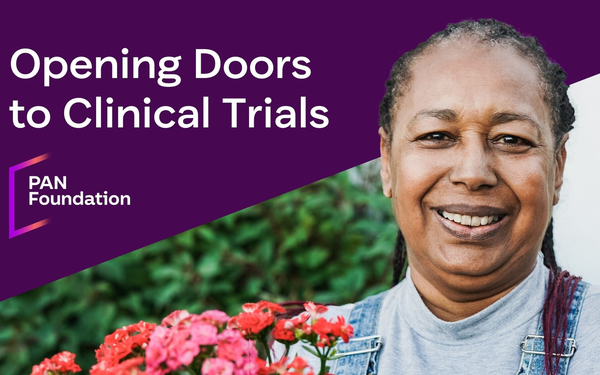HED:
DEK: As part of its “Opening Doors to Clinical Trials” initiative, PAN Foundation released survey documenting the lack of inclusion of LGBTQIA+ people, other
underrepresented groups

National healthcare advocacy
organization PAN Foundation shared data about LGBTQIA+ participation in clinical trials this week -- timed around Trans Awareness Week (Nov. 13-Nov. 19) -- to raise awareness of the issue of the lack
of such diversity in medical trials, and drive the participation of LGBTQIA+ people and other underrepresented groups in clinical trials.
“As we think about access to care, we want to
play a role in making sure that when it comes to advancing medical breakthroughs and looking at new treatments, not only do we encourage participation in clinical trials but participation from
underrepresented communities,” PAN Foundation Chief Mission Officer Amy Niles told Marketing Daily. “Only when we do so can we ensure safety and ensure the results are applicable
across the general population.”
advertisement
advertisement
According to data from PAN Foundation’s national survey, only 20% of LGBTQIA+ individuals have ever been invited to participate in a clinical trial
– despite 65% saying they’re interested in such participation. For trans people -- who struggle to navigate additional systemic barriers like medical bias, and combinations of sex
characteristics that fall outside the artificial binary of medical systems -- the lack of participation is particularly stark. According to Niles, under 1% of clinical trials contain information about
trans participants.
The survey also focused on other underrepresented groups including people of color, for whom the issue is complicated by a long, ugly history of abuse and exploitation by
the medical industry in the U.S. Rather than shy away from the issue, Niles said PAN Foundation decided to address it head-on with a page outlining “a chronology of all the egregious
things that have happened from 1776 to current.”
The “Opening Doors to Clinical Trials” initiative comprises three components: a digital educational platform which
Niles described as “a first stop for many individuals who want to learn the basics about clinical trials”; a simplified trial finder tool supplementing an existing government page which
Niles said many in focus groups found hard to navigate; and one-on-one live help through its “ComPANion Access Navigators” answering questions from a call center, trained to help
individuals find resources in callers’ local communities to help them overcome barriers to access.
Niles acknowledged that the work of organizations like PAN Foundation, which advocates
for healthcare reform legislation, in addition to its education and financial assistance initiatives, may become more difficult under the incoming presidential administration.
“The work
we’re doing has never been more important. We’re not going to be discouraged,” she said. “We will continue to be vigilant in terms of monitoring both the legislative and
regulatory environment, coming together where we need to, to comment, raise concerns, and advocate.”